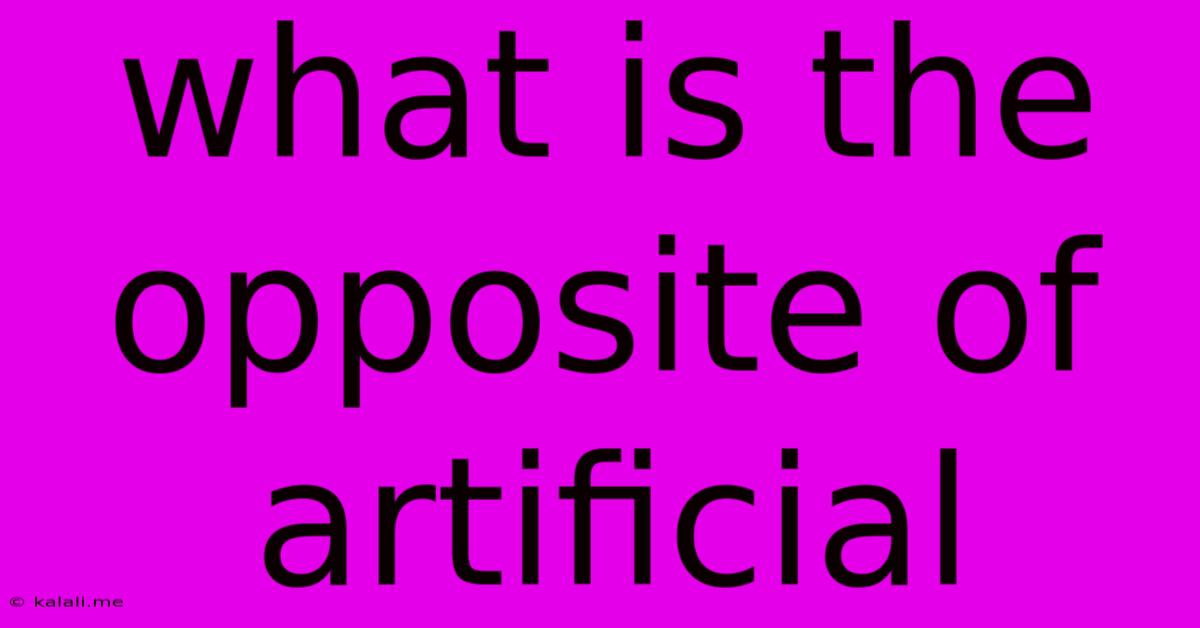What Is The Opposite Of Artificial
Kalali
Jun 13, 2025 · 3 min read

Table of Contents
What is the Opposite of Artificial? Exploring the Nuances of "Natural"
The question, "What is the opposite of artificial?" seems simple at first glance. A quick answer might be "natural." However, the relationship between these two words is far more nuanced than a simple antonym pairing. This article delves into the complexities of defining the opposite of artificial, examining various contexts and exploring the subtle differences between seemingly synonymous terms.
The most straightforward opposite of artificial is indeed natural. But what constitutes "natural"? This depends heavily on the context. In a scientific context, "natural" often refers to something occurring in or produced by nature without human intervention. This contrasts sharply with "artificial," which implies human creation or modification. Think of the difference between a natural diamond formed deep within the Earth and an artificial diamond created in a laboratory. Both are chemically identical, yet their origins fundamentally distinguish them.
Different Shades of Meaning: Beyond Natural and Artificial
However, the opposition isn't always so clear-cut. Consider these scenarios:
-
Artificial Intelligence vs. Human Intelligence: While "human intelligence" might seem like the obvious opposite of "artificial intelligence," it's more accurate to say they are distinct forms of intelligence rather than direct opposites. Artificial intelligence aims to mimic human intelligence, but it operates on fundamentally different principles.
-
Artificial Sweeteners vs. Natural Sweeteners: Here, the contrast is clearer. Artificial sweeteners are synthetically produced, while natural sweeteners are derived from natural sources like fruits or plants. However, even within "natural sweeteners," there's room for debate. Is honey, a product of bee activity, as "natural" as a berry growing wild in a forest?
-
Artificial Flavor vs. Authentic Flavor: "Authentic" flavor, in contrast to "artificial," often implies a connection to the original source material and a lack of chemical manipulation. This isn't always equivalent to "natural," as some natural flavors might be processed or extracted using techniques that could be considered artificial.
-
Artificial Light vs. Ambient Light: Artificial light, like that from a bulb, is created by human technology, whereas ambient light is naturally occurring, such as sunlight. This contrast is more straightforward and directly reflects the "man-made" vs. "naturally occurring" dichotomy.
The Spectrum of Human Intervention
The key to understanding the opposite of artificial lies in recognizing the spectrum of human involvement. Something is completely artificial when it's entirely human-made, devoid of any natural component. On the other hand, something completely natural is untouched by human hands. However, most things fall somewhere in between these two extremes. Consider a cultivated apple: it's a product of nature, yet heavily influenced by human intervention through grafting, fertilization, and pest control. Is it natural or artificial? The answer depends on your definition and the degree of human involvement you consider significant.
Context is Key: Understanding the Nuances
Ultimately, the opposite of artificial is highly context-dependent. While "natural" is often a suitable antonym, it's crucial to consider the specific domain and the extent of human intervention. Recognizing these nuances allows for a more precise and nuanced understanding of the terms "artificial" and "natural," and their respective relationships. By understanding these subtle distinctions, you can communicate more effectively and avoid ambiguities in your writing and discussions.
Latest Posts
Latest Posts
-
An Electron Is Accelerated From Rest Through A Potential Difference
Jun 14, 2025
-
Greater Than Less Than Calculator Decimals
Jun 14, 2025
-
What Are Two Elements That Are Liquid At Room Temperature
Jun 14, 2025
-
Gpa Requirements For Valdosta State University
Jun 14, 2025
-
At What Temperature Do Celsius And Fahrenheit Scales Coincide
Jun 14, 2025
Related Post
Thank you for visiting our website which covers about What Is The Opposite Of Artificial . We hope the information provided has been useful to you. Feel free to contact us if you have any questions or need further assistance. See you next time and don't miss to bookmark.